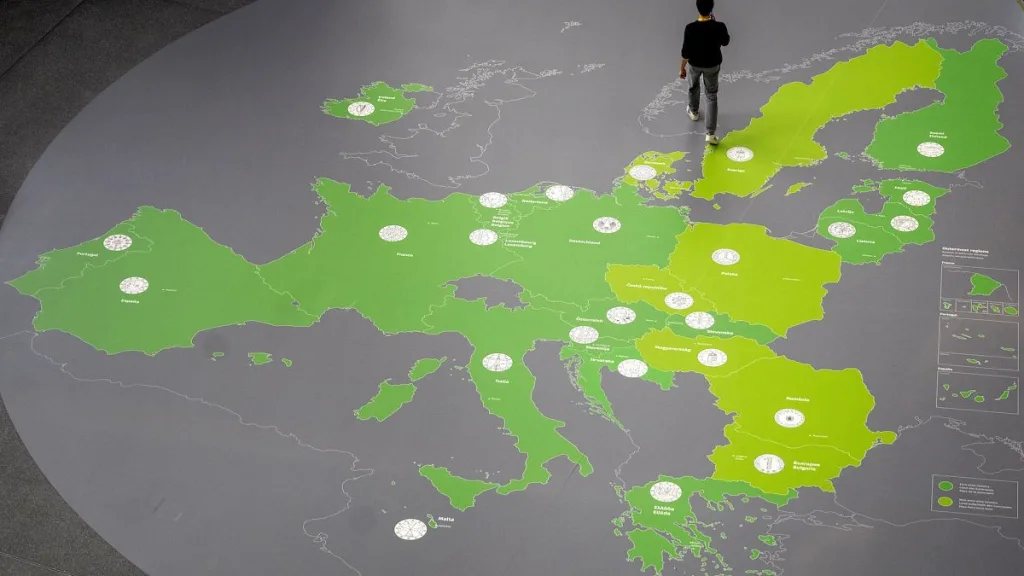The Eurozone’s services sector demonstrated a significant recovery in December, providing a boost to overall economic activity despite ongoing challenges in manufacturing and rising job cuts. Both Germany and France are grappling with contraction, largely due to persistent political uncertainties. As inflationary pressures continue to loom, the future trajectory of the European Central Bank’s interest rate remains uncertain.
Eurozone Services Sector Rebounds Amid Manufacturing Decline
As 2024 came to a close, the Eurozone’s private sector revealed a mixed performance, with December’s reports indicating a surprising comeback in the services domain despite ongoing difficulties in manufacturing and persistent political tensions.
This resurgence provides a flicker of optimism for economies in search of growth, though heavy clouds continue to hover over Germany and France.
Growth Indicators for Services, Manufacturing Remains Stalled
The Composite Purchasing Managers’ Index (PMI) for the Eurozone rose to 49.5 in December, an improvement from November’s 48.3 and surpassing the forecast of 48.2, based on flash data from S&P Global. Although this figure still registers below the critical 50-level that demarcates growth from contraction, the rate of decline has shown signs of moderation.
Notably, the services sector returned to growth, with the PMI jumping to 51.4 from the previous month’s 49.5. This marks a significant recovery following ten months of contractions. In contrast, the manufacturing sector continued its descent, experiencing its 21st consecutive monthly downturn, marking the most considerable decline seen in a year.
“Despite the manufacturing sector being firmly in recession, the resurgence of services output is a promising sign for the broader economy,” remarked Dr. Cyrus de la Rubia, Chief Economist at Hamburg Commercial Bank.
However, this increase in services activity sharply contrasts with sluggish new orders and escalating job cuts, which are occurring at the highest rate recorded in four years. Businesses are responding to decreased workloads by reducing their staff, raising concerns regarding the resilience of the labor market as we move into 2024.
Inflationary Pressures Reemerge
December saw a return of inflation, with both input costs and output prices increasing for the third consecutive month. Heightened wage agreements contributed to this pressure, prompting businesses to shift costs onto consumers.
“The PMI price indicators provide little reassurance—input costs are rising more swiftly, and selling prices are following suit,” commented de la Rubia. The European Central Bank’s cautious 25 basis point rate cut appears warranted as inflation concerns persist, according to experts.
The Economic Landscape in Germany and France
Germany and France, the largest economies in the Eurozone, continued to drag down overall performance in December. Both nations experienced a contraction in business activity, albeit at slightly reduced rates compared to previous months.
In Germany, the services sector exhibited tentative signs of stabilization, aided by rising real wages that could potentially stimulate consumer spending.
“We expect a recovery in the German services sector, driven by improved sentiment regarding future activities and the upcoming snap elections in February, which should foster greater political clarity,” stated de la Rubia. Nonetheless, the manufacturing sector remains deeply entrenched in recession, adding uncertainty to Germany’s economic recovery.
In France, the situation remains dire. Dr. Tariq Kamal Chaudry characterized the nation’s manufacturing struggles as the economy’s “Achilles heel,” with the manufacturing PMI remaining below 50 due to a notable lack of both domestic and international orders, impacting employment adversely as a result.
The service sector in France also struggled to find growth momentum after a brief boost during the Paris Olympics in summer. “Political uncertainty continues to impede business,” reported firms in the services sector, further deepening the economic malaise.
Market Reactions to PMI Findings
Financial markets largely remained indifferent to the PMI release. The euro maintains its value, with the euro to dollar exchange rate sitting around 1.0510. Eurozone bond yields remained stable, with the sensitive German 2-year Schatz yield flat at 2.05% and Bund yields also unchanged at 2.25%.
Stocks, however, displayed signs of strain. The Euro STOXX 50 and Euro STOXX 600 indices dropped by 0.3% and 0.2%, respectively, while France’s CAC 40 fell 0.6%, following Moody’s decision to downgrade France’s credit rating from Aa2 to Aa3, citing concerns over declining public finances amid enduring political instability.
Despite the downgrade, European banks showed resilience. The Euro STOXX Banks index increased by 0.5%, with Commerzbank and Deutsche Bank among the top performers, gaining 1.3% and 1%, respectively. France’s BNP Paribas saw a modest rise of 0.4%, while Société Générale and Crédit Agricole remained stable.
Future Outlook
The uptick in services activity provides a cautious silver lining for the Eurozone economy, yet substantial challenges persist. Ongoing political uncertainties, particularly in Germany and France, are obstructing essential reforms needed to revitalize growth. Moreover, the persistent struggles in the manufacturing sector combined with inflationary pressures threaten to keep the economy on shaky ground as we enter the new year.
For now, stakeholders in the Eurozone can take some comfort from the momentum in the services sector, but the journey toward economic recovery appears fraught with complications.
Photo credit & article inspired by: Euronews



